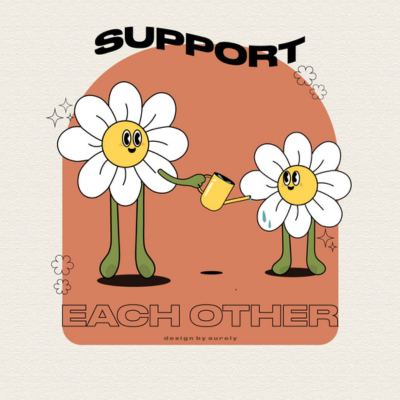
If you ask me, uncertainty has become our new normal. In these last few years, we have experienced an incredible stressor that impacted the entire world. As we tried to cope individually and collectively, we were hit with the next stressor. Most of us have never lived through a pandemic. Most people were deeply unsettled about the political climate. Concerns about the environment continue. There is a profoundly disturbing war. And now many women feel their fundamental rights are being threatened. Regardless of your beliefs and opinions about these huge stressors, they are tremendously upsetting to almost everyone. Many of the things we thought were certain—the grocery stores being stocked, the spontaneity of going out to dinner, the safety of our nation’s capitol, being able to travel with ease—are not certain anymore. This can be overwhelming, and we may feel that there is nothing we can do to feel better or to help others.
In the collective unknowing and changing ideas of what ‘normal’ is, there has been an increase in adverse mental health conditions in the United States. From 2019 to 2020, the CDC collected community-level data that demonstrated that the prevalence of depressive disorders increased by four times from 2019 to 2020 and anxiety disorder by three times over the same period. It also reported elevated substance use and trauma- and stressor-related disorders. 
Given this, what can we possibly do to help ourselves and each other?
- Think small.
Working with clients in both my mental health and coaching practices, I have seen a theme that impacts every single person. We all want to do something big to really make a difference for ourselves and/or others, yet the reality is that we most often cannot do something big. We can become paralyzed, inactive, and wonder why we should even bother to try.
I have also repeatedly seen that when people narrow their focus to small things that they can do for themselves and others, they do feel better. The key is doing this over and over again. Do one small thing, and then do another small thing. It takes effort and follow-through. Going to bed a bit earlier, watching the news for less time, donating to a food shelf. These are little things that make a difference. This leads me to my next two points.
- Focus on what you can control.
The American Psychological Association suggests a way to cope with feelings of uncertainty and hopelessness is to exert control in ways that you can, whether that be in your schedule and daily activities, the people you choose to surround yourself with or participating in community-level service. It can be so automatic to focus on what is outside our control. And right now, there is a lot that is out of our control. We start to spiral, and we want to do some big things in order to make a difference. When we focus on controlling the uncontrollable we usually feel more helpless and out of control. We don’t help ourselves or others by thinking about what we cannot change. That is why focusing on smaller areas within our own lives like our routine, social spaces, and activities can be empowering.
Here is an idea for how to start—it can be easier to start by changing our behaviors rather than our automatic feelings or thoughts. When trying to think of areas you want to incorporate into a daily routine, it can be helpful to reflect on what brings you joy. Over the past week, was there something that made you lose track of time? Maybe you got lost in a book or perhaps you were out enjoying nature. Maybe you spent some time with a friend and you both laughed so hard that the time just slipped away. You can schedule some of those pleasant activities into your routine to help shift your focus to the positive areas within your life.
- Practice gratitude.
Once you shift your behavior a bit you can turn up the volume on those pleasant feelings. A way to do this is to practice gratitude. Drs. Emmons and McCullough research how gratitude practices can positively influence our well-being and help us feel more optimistic about our lives. Some practices that you can incorporate as part of a routine can be journaling or reflecting on things you are grateful for on a daily basis. There are some great science-based workbooks and exercises available that can help guide you. This sort of practice can help you focus on things you have instead of focusing on areas where you are lacking or feel powerless.

Here is another really important thing: research shows that when you express gratitude to others, both the giver and the receiver benefit. When you remember how warm and fuzzy it made you feel when someone showed genuine appreciation to you, it can prompt you to want to spread those same feelings to others by expressing gratitude. Even the act of thanking someone else can build meaningful connections and improve your mood in the moment—uplifting you and the person you are expressing gratitude towards.
I know how difficult it can be to intentionally shift focus and think of smaller things we are grateful for or are within our control, especially when things are so uncertain and ever-changing in our world. However, I also know that making small changes can increase our overall happiness and wellness. So, if you are searching for ways to find your joy again, I encourage you to start where you can and celebrate the progress along the way. If you are interested in learning more about how I can support you, please reach out!
Contributor Statement: Olivia Knizek (oliviaknizek@my.unt.edu) contributed to the research and writing of this blog. Olivia is a PhD student in counseling psychology interested in athlete mental health, performing artists, and resiliency from trauma.
